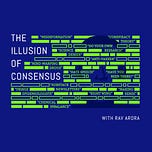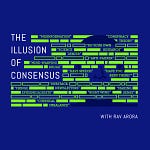Hi everyone,
Welcome to episode 16 of The Illusion of Consensus podcast. I'm professor Jay Bhattacharya. I'm here with Dr. Azadeh Khatibi. She is a doctor who has distinguished herself during the pandemic by engaging in this lawsuit against a law in California called AB 2098.
The law passed by the California legislature last year essentially put doctors at risk of losing their license if they contradicted public health advice. In effect, they basically made it so that the doctors had to look over their shoulder and see the CDC in the room with their patients, and they had to decide if they had the patient's interest in mind or the CDC's interest in mind.
I hope you enjoy this rich and engaging conversation with Dr. Khatibi. The Spotify and Apple links are available below as well as the highlighted podcast transcript. The full video podcast is also accessible to paid members here:
Full Video Interview: Dr. Azadeh Khatibi and Dr. Jay Bhattacharya
Watch now (63 mins) | Watch the full video interview with Dr. Azadeh Khatibi and Dr. Jay Bhattacharya on medical censorship, government over-reach, and individual autonomy here. For our loyal paid members at The Illusion of Consensus.
Spotify link:
Apple podcast link:
Transcript Highlights:
Dr. Khatibi on challenging consensus throughout her career:
In my own personal life and in my professional life, I have gone against formal consensus and informal consensus. Many times. I also feel like it's because I'm using my centred mind to make these decisions. I did it for my own health. I went against informal consensus opinion when I faced death and had to make some decisions about my own healthcare. I went against the informal consensus within my hospital care system. I've done it for my family members, I've gone against formal consensus for my family members, a matter for some health issues unrelated to COVID. And it turned out fantastic because we got data and information that we would have not otherwise gotten. And understanding that those consensus opinions were people taking into account the evidence as well as fiscal considerations. And for me, I was just looking at what's the smartest thing to do for these family members slash patients.
Dr. Khatibi talks about California’s bill AB 2098:
So in the declaration, I wrote from the perspective of both a physician and as a patient, because AB 2098, the law says that any doctor can be found to have unprofessional conduct if they engage in disinformation or misinformation. So disinformation, their definition was, knowing something is incorrect, but telling it to the patient anyway, right? Giving them false information that you know is false. I don't disagree with that. I think it's wrong and unethical for a doctor to give false information knowingly to a patient. But their other definition was also misinformation.
And so then they had the definition of misinformation in the bill. And their definition of misinformation was false information that's contradicted by contemporary consensus or something. And so I read that, I was like, this is terrible. This is horrible, right? Because all along I had been thinking differently from consensus and if I say something, they're gonna come after me. Like this is frightening and I already knew so many of my friends had been chilling their speech, playing small, being afraid, didn't wanna get fired.
Dr. Bhattacharya on how the leading scientific consensus has often been false:
Let's assess the track record of this consensus. Like how well did the CDC and the World Health Organization and the California Medical Association do in assessing sort of the nature of COVID, you know, the age gradient in mortality risk, the infection fatality rate, the immunity after COVID recovery, how well did it do in assessing whether the vaccine stops you from getting and spreading COVID? How well did we do in some of the most important questions about side effects of the vaccine for young men, especially with myocarditis. It seemed to me like the consensus was wrong on important topic after important topic after important topic.
Dr. Khatibi on how California’s censorship bill violated the 14th Amendment:
The law is so vague. And that's where the 14th Amendment right violation comes in. The law is supposed to be clear to a person of average intelligence. But we argued that this law is so mumble jumble. You can even hear that I kind of like, I'm like, well, what was the wording of the law again? It's so unclear and vague that it, and the grammar of it was also really bad. And the judge even said when he granted us the preliminary injunction, this law doesn't, the grammar of it doesn't even make sense. So that was the 14th Amendment rights violation, the right to due process, understanding that the law and making sure that it's clear that it was failed on, and that was the grounds actually upon which we won the preliminary injunction. The judge said this law is vague, it's not clear.
Azadeh shares her remarkably impressive success in filmmaking and production:
I got involved in a film called Window Horses with Sandra that was shortlisted for Academy Award nomination for best animated feature in 2018. That was one of 27 films that was shortlisted in that category. And I also helped produce that film and I played two voices. I was doing voiceover two characters in that film. And that was about creating intercultural, intergenerational bonds. It was about Iran. It was about love. It was about coming together, processing the past wounds. And then as I progressed in my filmmaking, I, we started a production company called Genius at Large. And so our projects are really looking at more of a human, humanity, human rights focus at this point. And so our film Sinjar was a co-production with Spain and looked at the Yazidi genocide of 2014. So ISIS came into Iraq and they invaded the city of the area of Sinjar and they killed the adults. the adult males and the older boys, and they enslaved the women and children, and they stole them and they sold them. So ISIS is very organized. They have actual slave markets.
















Share this post